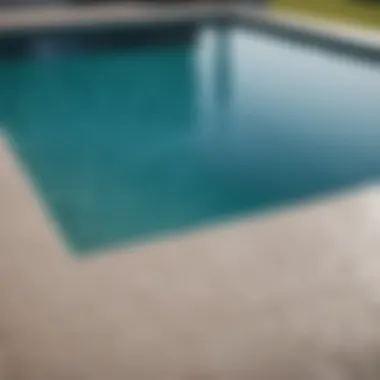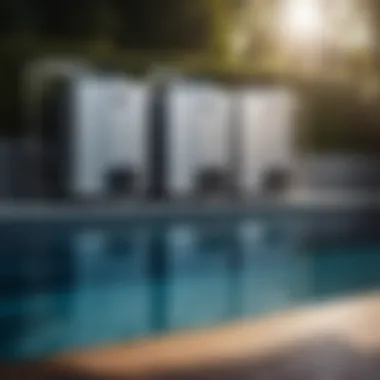Mastering Water Filtration Systems for Pristine Pool Waters


Materials:
- High-quality pool filter
- PVC piping (varying lengths based on pool size)
- PVC connectors and couplings
- Filter media (sand, diatomaceous earth, or cartridges)
- Pool pump
- PVC primer and cement
- Teflon tape
- Pool vacuum
- Bucket
- Hose
- Pool brush
- Water testing kit
- Safety goggles
- Gloves
DIY Steps:
- Begin by selecting the appropriate size and type of pool filter based on your pool's specifications.
- Measure and cut the PVC piping to fit from the pool to the pump and filter system, ensuring a proper and secure connection.
- Assemble the filter system with the chosen filter media, following the manufacturer's instructions carefully.
- Use PVC primer and cement to securely attach the piping and connectors to avoid leaks.
- Wrap all threaded connections with Teflon tape to prevent water seepage.
- Install the pool pump in a stable location near the pool, ensuring it is connected to the filter system.
- Use a pool vacuum to clean any debris from the pool before initiating the filtration system.
- Fill the system with water and check for any leaks or malfunctions.
- Test the water quality using a water testing kit to ensure proper chemical balance.
- Turn on the filtration system and monitor its performance for optimal water clarity.
Technical Aspects:
- Ensure all connections are watertight by applying PVC primer and cement liberally.
- Use the right size and type of filter media to effectively trap debris and contaminants.
- Prime the pump before starting it up to prevent airlocks.
- Regularly check and clean the filter system to maintain optimal performance.
DIY Project Process:
- After completing the installation, run the filtration system for a few hours daily to keep the pool water clean.
- Monitor the pressure gauge on the filter system and backwash when the pressure rises to ensure efficient filtration.
- If encountering cloudy water, backwash the system and check the filter media for clogging.
- Adjust the pump speed and filtration duration based on pool usage and environmental factors.
- Stay proactive in addressing any issues promptly to prevent water quality deterioration.
Troubleshooting Tips:
- If the water flow is weak, check for clogs in the pump or filter system and clean as needed.
- In case of leaks, tighten connections or reapply PVC primer and cement to secure joints.
- Address any unusual noises promptly by inspecting the pump and motor for malfunction.
- Consult a professional if encountering complex issues beyond basic troubleshooting measures.
Introduction
In the realm of swimming pool maintenance, one integral aspect that often takes the backseat in conversations is the optimization of water filtration systems. However, the truth remains that the heart of pristine pool water lies in an efficient filtration system. This critical component forms the backbone of water purity, ensuring that swimmers are greeted by crystal-clear and safe water every time they take a dip. Thus, our journey into the nuances of pool filtration systems becomes a vital one.
This initial phase sets the tone for our exploration, aiming to draw attention to the fundamentals before delving into the deeper realms of filtration systems' types, influencing factors on performance, and strategies for enhancing efficiency. By understanding the essence of water filtration optimization right from the outset, homeowners and housewives embark on a journey towards not mere pool maintenance, but a holistic approach to creating a haven of relaxation and enjoyment in their residences.
Importance of Water Filtration in Swimming Pools
Water filtration systems play a vital role in maintaining the cleanliness and safety of swimming pools. The importance of effective filtration cannot be overstated when it comes to ensuring crystal-clear water that is free from contaminants and bacteria. Without proper filtration, swimming pools can quickly become breeding grounds for algae, bacteria, and other harmful substances. This can not only compromise the aesthetics of the pool but also pose serious health risks to swimmers.
Investing in a high-quality water filtration system is paramount for pool owners looking to provide a safe and enjoyable swimming experience for their family and guests. By choosing the right filtration system and ensuring its proper maintenance, pool owners can significantly reduce the risks associated with poor water quality.
One of the key benefits of having a robust filtration system in place is the prevention of waterborne illnesses. Filtration systems help to remove impurities and contaminants from the water, ensuring that swimmers are not exposed to harmful bacteria or pathogens. Additionally, proper filtration enhances the clarity of the water, creating a more inviting and appealing swimming environment.


Considerations about the importance of water filtration in swimming pools extend beyond water quality; they also impact the longevity of pool equipment. Well-maintained filtration systems help to protect other components of the pool, such as pumps and heaters, from damage caused by debris and buildup. By investing in effective filtration, pool owners can prolong the lifespan of their equipment and reduce the need for costly repairs.
Overall, the significance of water filtration in swimming pools lies in its ability to maintain water quality, promote swimmer safety, and preserve the integrity of pool infrastructure. By prioritizing filtration efficiency, pool owners can enjoy a clean and well-maintained pool environment for years to come.
Types of Water Filtration Systems
Water filtration systems for swimming pools play a crucial role in maintaining clean and safe pool water. As pool owners, understanding the different types of filtration systems available is essential for optimizing water quality and ensuring a pleasant swimming experience.
Sand Filtration Systems
Benefits of Sand Filtration
Sand filtration systems are known for their effectiveness in capturing debris and particles from pool water. The key characteristic of sand filtration is its ability to trap even the tiniest particles, thus enhancing water clarity and cleanliness. This makes sand filtration a popular choice among pool owners looking for efficient filtration systems. One unique feature of sand filtration is its durability and low maintenance requirements, providing long-term benefits for pool maintenance.
Maintenance Tips
Maintaining a sand filtration system is relatively simple yet crucial for its optimal performance. Regular backwashing is essential to prevent clogging and ensure proper filtration. Additionally, checking and replenishing the sand bed when needed is necessary to uphold the system's efficiency. By following these maintenance tips, pool owners can prolong the lifespan of their sand filters and uphold water clarity effectively.
Cartridge Filtration Systems
Advantages of Cartridge Filtration
Cartridge filtration systems offer excellent filtration quality with minimal maintenance requirements. The key characteristic of cartridge filters is their ability to capture finer particles compared to sand filters, resulting in superior water quality. This makes cartridge filtration a popular choice for pool owners seeking a low-maintenance yet efficient filtration solution. The unique feature of cartridge filtration lies in its ease of use and convenience, making it a convenient option for ensuring clean pool water.
Cleaning Procedures
Cleaning cartridge filters involves rinsing them with a hose to remove debris periodically. Deep cleaning with a filter cleaner solution is recommended to maintain optimal performance. The key characteristic of cartridge cleaning procedures is their simplicity and effectiveness in restoring filter efficiency. This easy maintenance routine ensures prolonged filter lifespan and consistent water clarity for pool owners.
Diatomaceous Earth (DE) Filtration Systems
Usage of DE Filters
DE filters are highly efficient in trapping even the smallest particles in pool water, offering exceptional water clarity. The key characteristic of DE filters is their microscopic filtration capability, ensuring superior water quality. This unique feature makes DE filtration a popular choice for pool owners prioritizing pristine pool water. Its efficient filtration performance contributes significantly to maintaining a hygienic swimming environment.
Replacing DE Filter Powder


Regularly replacing DE filter powder is essential for sustaining the effectiveness of the filtration system. The key characteristic of replacing DE filter powder is its direct impact on filtration efficiency. By ensuring timely replacement, pool owners can uphold optimal filtration performance and prevent issues such as reduced water clarity. This maintenance task plays a vital role in guaranteeing continuous clean and clear pool water for leisure and enjoyment.
Factors Influencing Filtration System Performance
In the realm of swimming pool maintenance, achieving optimal water quality relies significantly on factors that influence filtration system performance. This critical aspect plays a pivotal role in ensuring the efficiency and effectiveness of water filtration processes. The performance of water filtration systems can be influenced by various factors, including pump size and flow rate, filter media quality, and regular maintenance. Each of these elements plays a unique role in determining the overall performance and longevity of the filtration system.
Pump Size and Flow Rate
Determining Optimal Pump Size
Importance of Flow Rate
The flow rate of a filtration system is equally crucial in maintaining water quality in swimming pools. Flow rate refers to the volume of water that passes through the filtration system within a specified time frame. An adequate flow rate is essential for efficient filtration and effective removal of contaminants from the pool water. By understanding the importance of flow rate and its correlation with filtration effectiveness, pool owners can make informed decisions when selecting filtration equipment. Balancing the flow rate with the pump size and filter capacity is key to achieving optimal water filtration performance.
Filter Media Quality
Selecting the Right Filter Media
Choosing the appropriate filter media is fundamental to enhancing the efficiency of water filtration systems in swimming pools. The quality of filter media directly influences the filtration process by capturing debris, contaminants, and impurities from the pool water. Selecting the right filter media, such as sand, cartridges, or diatomaceous earth, is essential for achieving clean and clear pool water. Each type of filter media offers distinct advantages and efficiencies, catering to specific filtration needs based on the pool size, usage frequency, and surrounding environment.
Effects of Poor Filter Media
On the contrary, using poor-quality or deteriorated filter media can compromise the filtration system's performance and water quality. Inadequate filter media may fail to effectively trap debris, leading to cloudy water, algae growth, and increased strain on the filtration equipment. Understanding the effects of poor filter media highlights the importance of regular inspection, maintenance, and timely replacement of filter media to sustain optimal filtration efficiency in swimming pools.
Regular Maintenance
Cleaning Schedules
Maintaining a consistent cleaning schedule is imperative for preserving the functionality and longevity of water filtration systems in swimming pools. Establishing a routine cleaning regimen helps prevent debris buildup, clogging, and filter inefficiencies. Cleaning schedules should be tailored to the specific needs of the pool, considering factors like usage frequency, environmental conditions, and water quality. By adhering to regular cleaning schedules, pool owners can ensure continuous filtration performance and extend the lifespan of the filtration system.
Replacing Filter Elements
Periodic replacement of filter elements is essential for sustaining effective filtration in swimming pools. Over time, filter elements such as cartridges, sand, or diatomaceous earth become saturated with contaminants and lose their filtration capacity. Timely replacement of filter elements is crucial to prevent reduced filtration efficiency, inadequate water clarity, and potential equipment damage. Understanding when and how to replace filter elements is key to maintaining optimal filtration performance and preserving water quality in swimming pools.


Enhancing Filter System Efficiency
In the realm of water filtration for swimming pools, enhancing filter system efficiency stands as a crucial focal point. Efficient filtration plays a pivotal role in maintaining the cleanliness and safety of pool water, ensuring a pleasant swimming experience for all. By focusing on enhancing filter system efficiency, pool owners can optimize performance, reduce maintenance costs, and promote sustainable water management practices. Techniques such as backwashing, chemical balancing, and utilizing variable speed pumps are integral to this process.
Backwashing Techniques
Proper Backwashing Procedures
Proper backwashing procedures form the cornerstone of maintaining optimal filter performance. By following specific backwashing techniques, pool owners can effectively flush out trapped debris and contaminants from the filter media, allowing for improved water circulation and filtration efficiency. The key characteristic of proper backwashing procedures lies in their ability to prevent clogging and pressure build-up within the filtration system, ensuring continuous and reliable operation. This method is a popular choice for this article due to its proven efficacy in enhancing filter system efficiency and prolonging the lifespan of filtration equipment.
Frequency of Backwashing
Determining the correct frequency of backwashing is essential for maintaining peak filter performance. Understanding the unique needs of the pool, such as usage levels and environmental factors, helps in establishing a suitable backwashing schedule. By highlighting the importance of regular backwashing, pool owners can prevent filter blockages and promote optimal water quality. The key characteristic of frequency of backwashing lies in its ability to ensure consistent filtration efficiency and extend the longevity of filter media, resulting in cost-effective maintenance practices.
Adding Pool Chemicals
Effective Chemical Balancing
Effective chemical balancing is paramount in achieving and maintaining water clarity and sanitation in swimming pools. By carefully measuring and adjusting chlorine, pH levels, alkalinity, and other chemical parameters, pool owners can create a safe and comfortable swimming environment. The key characteristic of effective chemical balancing is its role in preventing bacteria growth, algae formation, and waterborne illnesses, thus safeguarding the health of pool users. This approach is a popular choice for this article due to its fundamental importance in enhancing filter system efficiency and promoting water quality.
Impact on Filtration
The impact of pool chemicals on filtration cannot be understated. Proper chemical balance directly influences the performance of filtration systems, as imbalances can lead to clogging, reduced efficiency, and equipment damage. Highlighting the influence of chemicals on filtration efficacy underscores the need for vigilant water testing and treatment. The key characteristic of this aspect lies in its ability to synergize with filtration systems, ensuring seamless operation and water purity. By discussing the impact of chemicals on filtration, pool owners can make informed decisions to optimize system efficiency and longevity.
Installation of Variable Speed Pumps
Benefits of Variable Speed Pumps
Variable speed pumps offer significant advantages in enhancing filter system efficiency. By allowing for customizable flow rates based on pool demands, these pumps provide energy savings, reduced operating costs, and enhanced filtration performance. The key characteristic of variable speed pumps is their ability to adapt to varying pool requirements, optimizing water circulation and filtration. This feature makes them a beneficial choice for this article, emphasizing the importance of energy-efficient and sustainable filtration solutions.
Energy Efficiency
Energy efficiency is a focal point in the installation of variable speed pumps. By maximizing energy usage and minimizing wastage, pool owners can lower their utility bills and reduce environmental impact. The key characteristic of energy efficiency in variable speed pumps lies in their ability to operate at lower speeds without compromising filtration effectiveness, showcasing their sustainable design and cost-saving benefits. Discussing energy efficiency highlights the advantages of adopting modern pump technologies, underscoring their contribution to enhancing filter system efficiency in swimming pools.
Conclusion
In the realm of water filtration systems for swimming pools, the conclusion serves as a critical juncture where all the intricacies and technicalities discussed throughout the article converge. It encapsulates the essence of optimizing water filtration systems to ensure pristine and safe pool water, emphasizing the paramount importance of efficient filtration processes.
Moreover, the conclusion underscores the significance of regular maintenance and proper backwashing techniques in enhancing the longevity and performance of filtration systems. By following recommended cleaning schedules and replacing filter elements as needed, pool owners can prolong the lifespan of their filters and uphold optimal water quality for swimmers.
In essence, the conclusion of this article reaffirms the necessity of prioritizing efficient water filtration in swimming pools to enjoy a hygienic and enjoyable swimming experience. By implementing the insights and recommendations provided in this guide, pool owners can take proactive steps towards ensuring clean and safe pool water for their family and guests.







